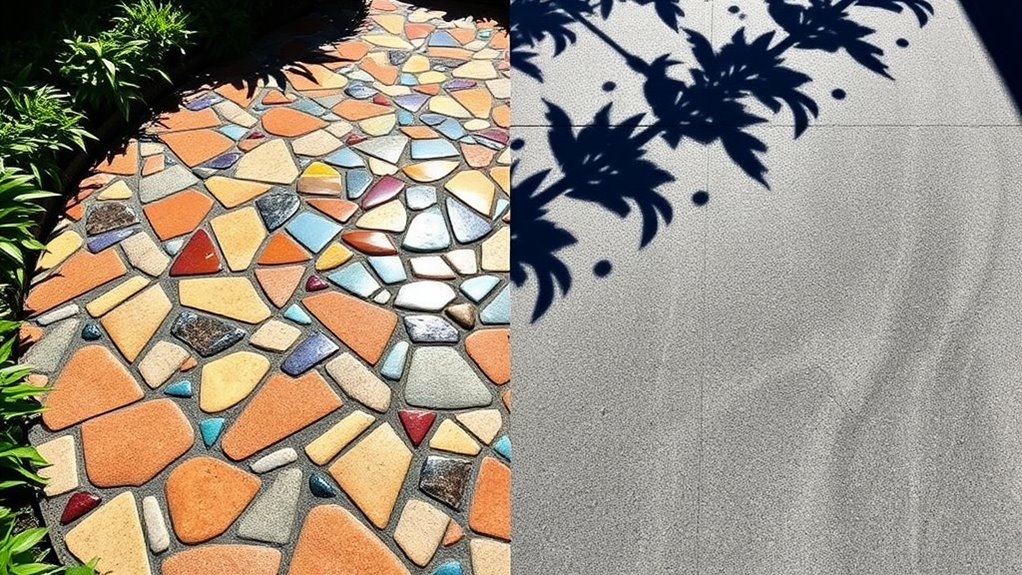Resin bound patios and concrete patios each offer distinct advantages for UK homeowners. Resin bound surfaces provide a seamless, smart finish that lets rainwater drain naturally – particularly useful for our British weather. They'll last about 30 years with minimal fuss, though they're pricier and must be fitted by specialists. Concrete patios cost less to install and handle heavy use brilliantly – perfect for family gardens and BBQ areas. However, they tend to crack over time, especially during harsh winters, and need regular maintenance to keep them looking fresh. Think about your budget and practical needs; if you're after a low-maintenance option and can stretch your budget, resin bound is worth considering. For a cheaper, tried-and-tested solution that you can personalise, concrete remains a solid choice.
Key Takeaways
Durability: Resin bound patios last around 30 years without cracking, whilst standard concrete driveways manage 25-50 years with proper care.
Maintenance: Resin bound surfaces need minimal attention – just an occasional sweep and rinse. Traditional concrete requires frequent jet washing and resealing to keep it looking fresh.
Aesthetic Appeal: Resin bound comes in countless colours and creates a seamless finish – quite smart compared to concrete's basic appearance. Think of the difference between a premium garden design and a standard driveway.
Installation: Both need professional fitting, but resin bound demands specialist knowledge. Get it wrong, and you'll end up with unsightly cracks and dips.
Initial Cost: While pricier upfront than concrete, resin bound proves cost-effective long-term. You'll save on maintenance costs, plus it adds value to your property.
Overview of Patio Types
Understanding different patio types is essential for making the right choice for your garden. The material you select affects both looks and practicality.
Concrete patios offer excellent value for money and need little upkeep. You can customise them with various patterns and colours, making them suitable for most garden styles. They're particularly popular in urban gardens where a clean, modern look is desired. However, they can crack easily under extreme weather conditions, which may affect their longevity. This type of patio may also benefit from routine low maintenance to enhance its lifespan.
Flagstone creates a classic British garden look but comes at a higher price. Each stone has unique characteristics, lending charm to your outdoor space. Though they need occasional maintenance, they cope well with our varied British weather.
Paver patios strike a balance between cost and durability. They're versatile enough for both contemporary and traditional gardens, with options ranging from simple brick patterns to complex geometric designs.
Alternative choices include gravel, tile and wooden decking. Gravel works brilliantly for country-style gardens and provides good drainage during wet weather.
Tiles suit modern spaces and clean easily, whilst wooden decking offers a traditional feel but needs regular treatment against our damp climate.
The right choice depends on your garden style, budget and how much maintenance you're willing to undertake.
Advantages of Resin Bound Patios
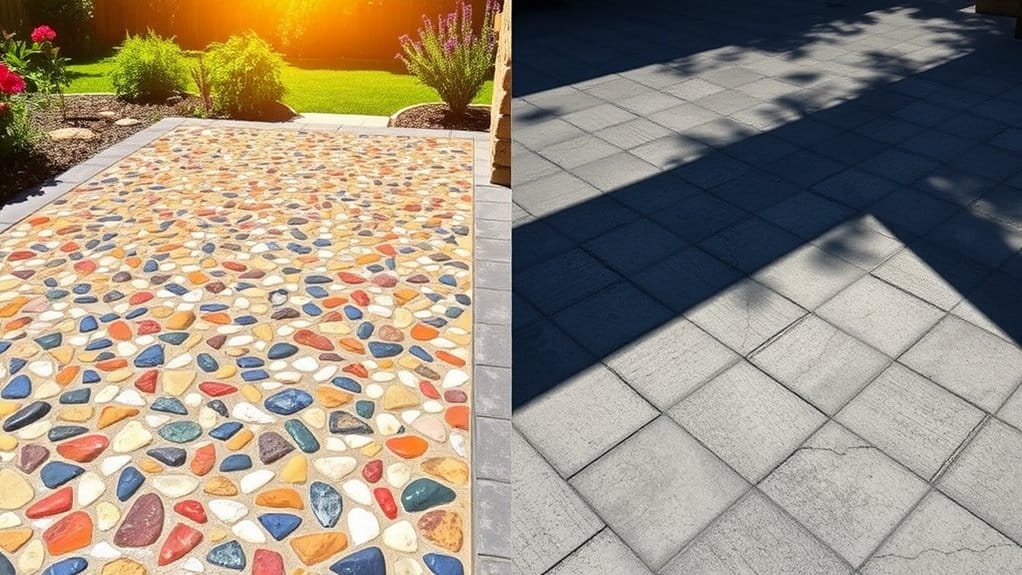
Resin bound patios combine durability and smart looks, making them increasingly popular with UK homeowners. When properly installed, they last up to 30 years without cracking, fading or wearing down, even under heavy use. The robust bond between stone and resin creates a tough surface that handles British weather brilliantly.
These patios excel in design flexibility. Whether you fancy warm Mediterranean tones or traditional Yorkshire stone colours, there's a mix to match your taste. The smooth, joint-free finish looks far smarter than standard paving or concrete, whilst the natural stone gives it a premium feel. Additionally, their aesthetic appeal enhances outdoor spaces, making them a striking addition to any property.
Looking after a resin bound patio couldn't be simpler. Unlike typical garden paths, weeds can't push through, and most stains wash away easily. Just sweep regularly and give it an occasional blast with the pressure washer.
The surface lets rainwater drain through naturally, so you won't get puddles forming after typical British downpours – particularly handy for our wet winters.
Disadvantages of Resin Bound Patios

The initial outlay for resin bound patios can be quite steep compared to traditional paving options. Additionally, proper installation is essential for achieving optimal performance, as quality of installation significantly affects durability and lifespan. Resin bound patios can last between 15-25 years when installed correctly, showcasing their long lifespan advantages.
Sunlight poses a real challenge – without UV-stable resin, your patio may turn yellow or fade, rather like an old plastic garden chair left out in the sun.
The installation must be spot-on; shoddy workmanship often results in cracks, loose stones and uneven surfaces.
It's crucial to hire skilled installers with proven experience in resin bound surfaces, much as you'd seek out a qualified builder for an extension.
Whilst these drawbacks shouldn't necessarily put you off, they warrant careful consideration before committing to this paving choice.
Initial Cost Concerns
Initial expenses for resin bound patios can be steep, putting off many homeowners.
A standard 20m² single car driveway costs between £670 to £1,020 for materials alone. For a double driveway, expect to pay £1,600 to £2,050, plus labour costs.
Installation requires professional expertise – this isn't a DIY job.
Premium materials improve quality but raise costs further. Don't forget to account for VAT, delivery charges and any required planning permissions.
While pricier than concrete or tarmac options, resin bound surfaces deliver lasting value.
Still, the upfront investment is substantial, so carefully weigh your budget against long-term benefits before committing.
UV Discoloration Risks
UV discoloration is a prime concern for UK homeowners looking to install resin bound patios.
Though manufacturers use UV-stable resins, British sunlight can still cause noticeable fading over time – particularly in lighter shades.
Think of it like garden furniture cushions – leave them out all summer, and they'll likely lose their vibrancy. The same principle applies to resin surfaces, though the process is more gradual.
To protect your investment, proper UV defence is crucial. Regular cleaning paired with UV-protective sealers helps maintain the colour's richness.
Whilst you might fancy doing it yourself, getting a professional to apply these sealers typically delivers better, longer-lasting results.
For maximum protection in our British climate:
- Choose darker colours where practical
- Clean the surface regularly
- Apply quality UV sealers
- Keep up with maintenance
These steps will keep your patio looking smart for years to come.
Installation Quality Importance
Quality Installation: The Key to Lasting Resin Bound Patios
Proper installation directly affects how long your resin bound patio will last and how well it performs. Poor workmanship often leads to cracking, lifting and surface problems. The minimum depth should be 15mm, whilst a solid sub-base is crucial for an even finish.
Essential installation factors include:
| Installation Aspect | Potential Issues |
|---|---|
| Depth of Resin | Cracks and lifting if too shallow |
| Resin Quality | Poor mixing causes patchy surfaces |
| Weather Conditions | British weather can disrupt curing |
| Sub-Base Stability | Weak foundations create dips and bumps |
Professional installation matters – much like laying a carpet, the finish is only as good as the preparation and expertise behind it. Getting it right first time prevents costly repairs later. Critical factors include:
- Precise resin mixing
- Proper curing time
- Suitable weather conditions
- Stable ground preparation
Think of it like baking a cake – skip steps or rush the process, and the end result simply won't hold up.
Advantages of Concrete Patios
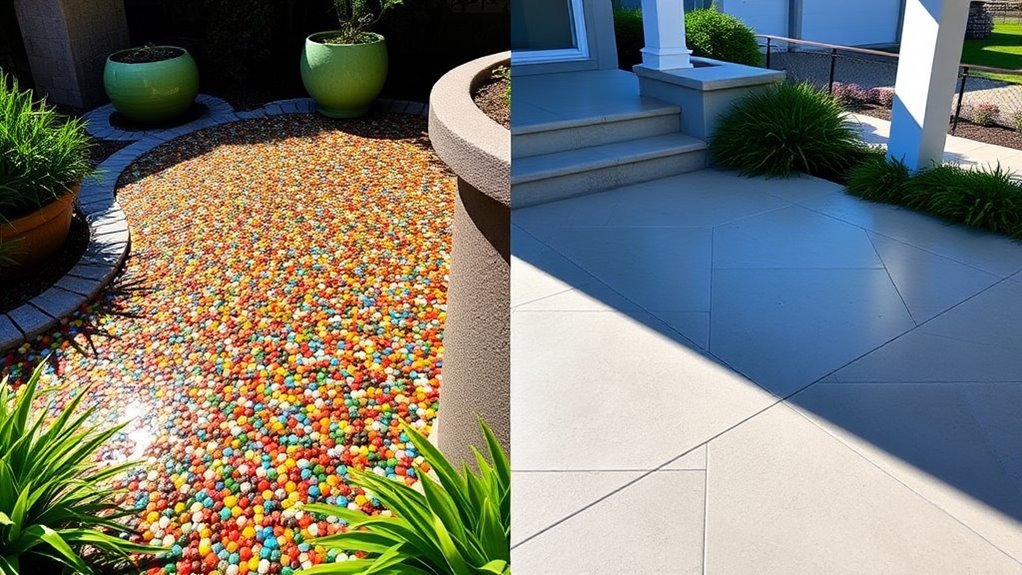
Concrete patios prove exceptionally practical for British gardens, offering top value for money and remarkable staying power.
These sturdy surfaces cope brilliantly with daily family use, from garden parties to children's play. Unlike timber decking, which often needs yearly treatment, concrete requires minimal upkeep and rarely needs repairs, saving both time and money.
Whether you're hosting summer barbecues or setting up garden furniture, a concrete patio stands up to whatever the British weather throws at it.
Cost-Effective Solution
Concrete patios offer a cost-effective way to improve your outdoor space. Comparing costs, concrete proves cheaper than natural stone or brick, both for materials and installation.
You'll spend less fitting a concrete patio than you'd laying pavers or building a wooden deck.
The savings continue long-term. Concrete needs little upkeep, unlike wooden decks that require regular staining and sealing.
It stands up brilliantly to British weather, from summer heat to winter frost, which means fewer repair bills over the years. While wooden patios might need replacing after 10-15 years, a well-laid concrete patio can last several decades.
A concrete patio also adds value to your property by creating practical outdoor living space.
You can customise the look with different finishes, colours and patterns – think exposed aggregate for a modern look or stamped patterns that mimic paving stones.
It's a sensible investment that balances initial cost with lasting performance, perfect for UK homeowners watching their budgets.
Heavy Traffic Endurance
Concrete patios handle heavy foot traffic brilliantly, making them perfect for busy homes and gardens. The durable makeup of concrete means it can cope with substantial daily use whilst keeping its strength for decades. When properly installed and maintained, these patios typically last 25 to 50 years or more.
Adding steel rods or fibres to the concrete makes it even stronger, preventing cracks when under heavy weight. Stamped concrete offers extra grip, which is vital in well-used areas, particularly in Britain's wet weather. A proper sealant guards against our damp climate and harsh UV rays, greatly extending the patio's life.
Concrete patios need less upkeep than other materials like timber or gravel. A fresh seal every few years is usually enough to keep them in top form.
Opting for thicker slabs provides better resistance to wear and cracks. For areas with constant foot traffic, concrete patios offer the right mix of toughness and style, proving their worth as a practical choice for British homes.
Disadvantages of Concrete Patios
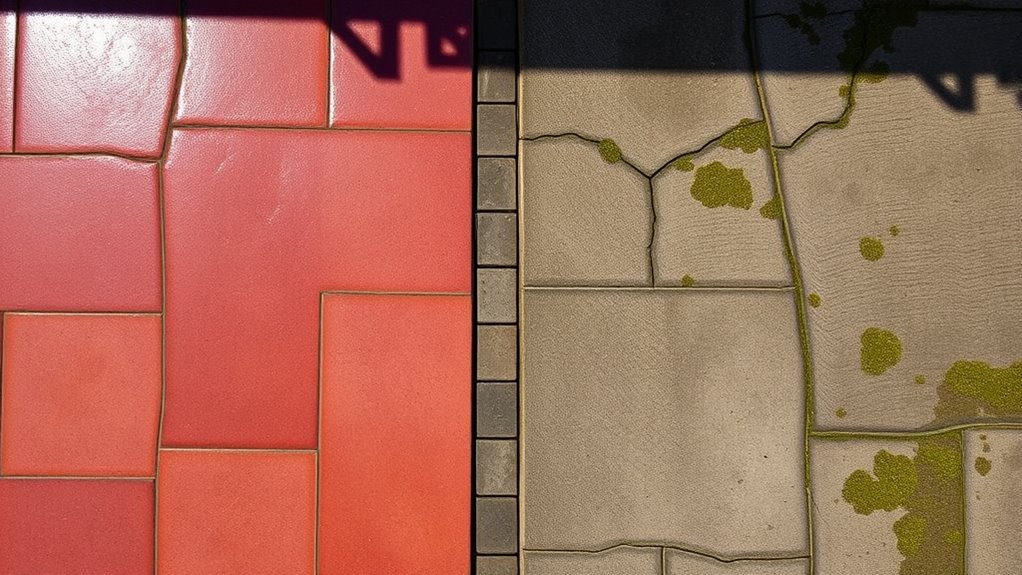
Installing a concrete patio presents several drawbacks worth considering. The most significant issue is cracking, particularly common in Britain's variable climate where freeze-thaw cycles can cause significant damage, leading to expensive repairs. Once laid, concrete offers little flexibility for design changes.
Quick comparison of concrete patio drawbacks:
| Drawbacks | Details |
|---|---|
| Cracking Problems | Prone to cracks; costly to repair. |
| Design Constraints | Limited colour and pattern choices. |
| Installation Issues | Expensive and weather-dependent curing. |
The initial cost and need for skilled tradespeople can be off-putting. British weather significantly affects curing time, typically requiring 7-10 days before use. While concrete can imitate other materials like stone or brick, it lacks the versatility of alternatives such as resin bound surfaces. Additionally, concrete surfaces may also be less environmentally friendly compared to permeable resin surfaces, which provide better drainage. These factors need careful consideration before choosing a concrete patio.
Maintenance and Lifespan Comparison
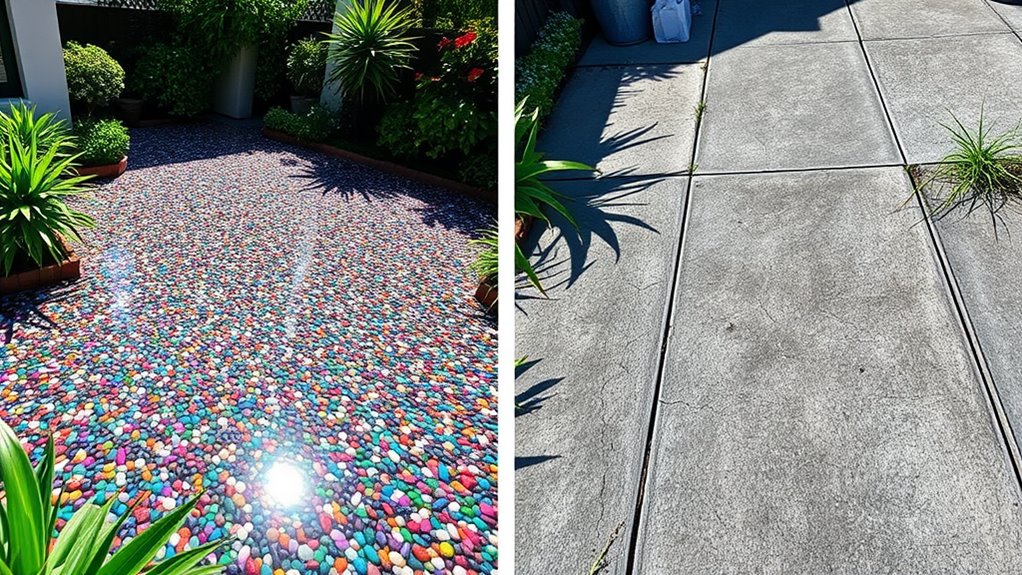
Resin bound patios edge ahead of concrete when comparing maintenance needs and longevity.
A resin surface needs little more than a quick sweep and occasional pressure wash throughout the year. Its non-porous finish naturally fights off weeds and moss, much like a waterproof jacket repels rain. With proper installation, expect your resin patio to serve you well for up to 30 years. Regular inspections and hand-pulling of weeds support weed prevention strategies that enhance the durability of the patio.
Concrete patios prove more demanding.
You'll need to crack on with regular power washing, apply sealant every couple of years, and keep an eye on tree roots that might cause damage. Though concrete can stick around for decades, British weather takes its toll – think cracking from frost and staining from fallen leaves.
Environmental Impact Analysis
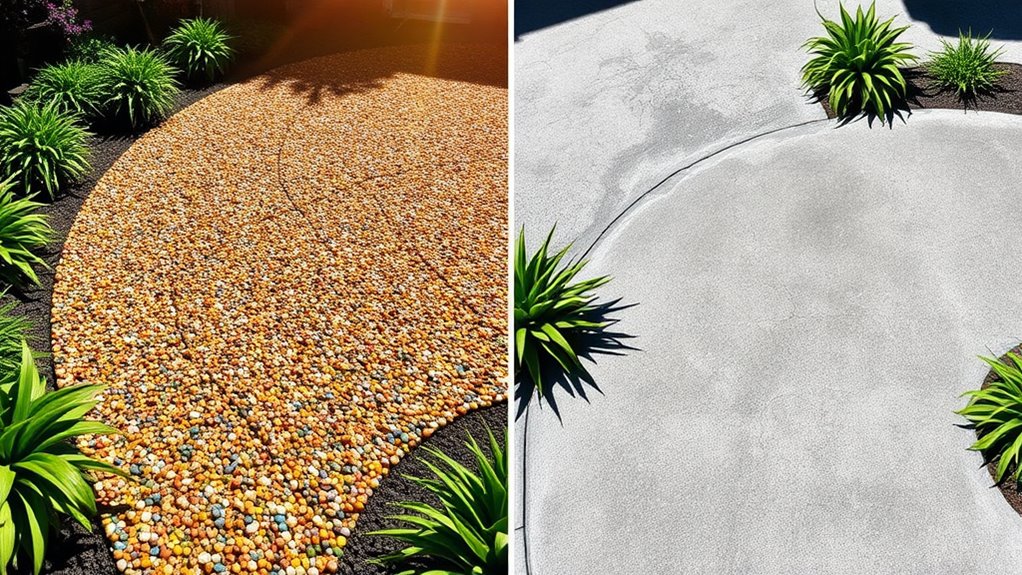
The environmental impact of patio materials deserves careful consideration alongside maintenance and lifespan.
Resin bound patios offer notable environmental benefits through their sustainable materials and durability. Their permeable surface allows effective water drainage, which reduces flooding risks and supports sustainable urban drainage systems (SUDS) whilst maintaining healthy groundwater levels.
You can opt for resin bound surfaces made from recycled stone, which helps minimise waste and supports local ecosystems. These systems have a smaller carbon footprint than concrete and need less groundwork.
The UV-stable resin prevents harmful microplastic pollution in our waterways.
The smooth, even surface makes resin bound patios particularly accessible, including for wheelchair users. Their flexible design works well around existing garden features like trees and plants.
Choosing a resin bound patio means investing in a sustainable option that's both practical and environmentally responsible – a sensible choice for your property and the environment. Moreover, their ability to mimic natural drainage patterns allows for effective groundwater infiltration, further enhancing sustainability efforts.
Frequently Asked Questions
How Do Weather Conditions Affect Resin Bound Patios?
Resin bound patios perform well in British weather conditions. They cope admirably with our hot summers and wet winters, resisting common issues like cracking during temperature swings. Much like a proper raincoat, these surfaces handle rainfall effectively, allowing water to drain through rather than puddle. This makes them particularly suited to our changeable climate, requiring little upkeep throughout the year.
Can Resin Bound Patios Be Installed Over Existing Surfaces?
Resin bound patios can indeed be laid over existing surfaces, provided they're sound and stable. The base surface – whether concrete or tarmac – must be crack-free and properly prepared. A thorough clean and prime of the existing surface is essential before installing the resin bound system. Think of it like painting a wall – skipping preparation leads to poor results. Common surfaces suitable for overlay include concrete driveways, stable paving and solid tarmac bases, though each requires assessment before work begins.
What Is the Best Way to Clean a Resin Bound Patio?
Regular sweeping and gentle hosing keeps your resin bound patio clean year-round, with a twice-yearly pressure wash for deeper maintenance. For tough marks, a mild soap solution works well – just avoid harsh chemicals that might damage the surface. A good scrub with a soft brush tackles moss and algae, particularly common in Britain's damp climate. Quick attention to spills and seasonal care will keep your patio looking fresh.
How Long Does It Take to Install a Concrete Patio?
Installing a concrete patio typically takes 7-9 days from start to finish, including ground preparation, construction and curing time. The timeline may vary based on your patio's size and complexity, whilst British weather conditions can impact the schedule – particularly during wet or cold spells.
Are There Any Color Options for Concrete Patios?
Concrete patios offer numerous colour options to suit any home style. You can choose from classic shades like warm browns and soft greys, to bolder tones such as deep reds and charcoal. Common choices amongst UK homeowners include natural sandstone hues and slate-inspired colours that complement British architecture. The colouring can be achieved through staining or adding pigments to the concrete mix, giving you full control over the final look.
Conclusion
Resin bound and concrete patios each offer distinct advantages. Resin bound surfaces provide a smart, contemporary look and need minimal upkeep – perfect for busy homeowners who'd rather spend weekends in the garden than maintaining it. Concrete, whilst more traditional, proves both robust and budget-friendly, much like choosing between carpet and hardwood flooring indoors. Your decision should match your practical needs and local climate, particularly considering Britain's wet weather, to ensure your investment serves you well.
